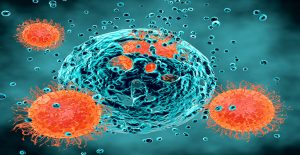
A targeted therapy to block a protein that suppresses T cell activity could improve cancertreatment with immune checkpoint inhibitors, researchers have found.
EZH2 is elevated in immune T cells in patients after treatment with ipilimumab, a team at the University of Texas MD Anderson Cancer Center showed. The drug unleashes an immune response by blocking the activity of CTLA-4 on T cells – white blood cells that serve as the ‘targeted warriors’ of the adaptive immune system.
Padmanee Sharma, senior author of the study and professor of Genitourinary Medical Oncology and Immunology at the centre, said immune checkpoint therapy had led to“significant clinical responses in some patients but in order to provide benefit to even more patients, we will need rationally designed combination therapies”.
“Our studies show that anti-CTLA-4 therapy can lead to increased EZH2 expression in T cells, which can act to diminish T cell responses,” she added.
Preclinical research in mice showed that combination therapy using a drug that inhibits EZH2 and ipilimumab improved T cell responses, tumour rejection, and extended survival.
MD Anderson researchers translated these findings into the clinic, and a phase I clinical trial of the combination started this spring. The safety and dosing trial treats patients with advanced tumours with either combination of CPI-1205 and ipilimumab, or CPI-1205 and pembrolizumab, which blocks PD1 – a different immune checkpoint.
Researchers said treatment with the ipilimumab and CPI-1205 combination caused “major reductions” in tumour growth and significantly increased survival. It also reduced the percentage of regulatory T cells and increased tumour-penetrating effector cells compared to treatment with either drug alone in two types of mice, one that develops bladder cancer and one with melanoma.
Treating mice that have EZH2 knocked out with ipilimumab resulted in complete tumour rejection by the immune system. No immune-related toxicities were seen in mice treated with the combination.